Sorted by date Results 151 - 175 of 294
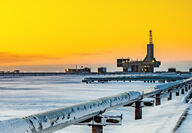
The United States is heavily dependent on China and other foreign suppliers for its barite, a mineral critical to the petroleum sector. Barite derives from barús, the Ancient Greek word for heavy, owing to an exceptionally high specific gravity for a non-metallic mineral. It is this weight that makes barite a key element to the oil and gas sector and lands the mineral on USGS' critical list. "More than 90% of the barite sold in the United States was used as a weighting agent...
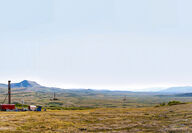
Northern Dynasty Minerals first set its sights on Alaska's Pebble deposit in the 1990s. After acquiring the property in 2001, the company spent more than a decade and close to $1 billion proving it up as one of the greatest mineral resources ever discovered – certainly on American soil. Consider the following: • contained copper at Pebble is equivalent to ~1.3% of all the copper metal ever discovered or produced in the past 10,000 years; • contained gold at Pebble is equiv...
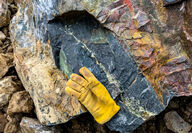
More than six years after turning its attention to advancing to production the world-class mineral reserves of its Nico project in Northwest Territories, Fortune Minerals Ltd. is again putting boots on the ground in search of new mineralization near the Nico deposit located 160 kilometers (99 miles) northwest of Yellowknife. The tenacious junior reported Sept. 2 that an exploration program planned for the 2020 field season is underway, despite restraints imposed by the...

National Mining Association President and CEO Rich Nolan says the COVID-19 pandemic has exposed the risks associated with America's overreliance on foreign supply chains for nearly every sector of the economy, especially when it comes to minerals. "As states continue to open across the country, we must focus on investing in and establishing domestic supply chains to help speed our economic recovery and make us more resilient to future crises," he penned in a June 9 letter....

Fortune Minerals Ltd. May 7 announced that it continues to make progress on a new mine plan for its Nico cobalt-gold-bismuth-copper project in Northwest Territories during the coronavirus pandemic. The company said it is complying with government COVID-19 protocols, including temporary closure of its head office in Ontario, prohibiting non-essential travel and social distancing. Working from home, Fortune employees, with some assistance from engineering consultants, continue...

On April 6, President Donald Trump issued an executive order for the United States government to work with industries on moving forward with space exploration, and the exploitation of minerals and water discovered to further that cause. This of course has raised concerns from other nations, primarily Russia and China, who tout the Moon Treaty drawn up by the United Nations in 1979. This widely unpopular pact states that space resources are "global domain," which means they...
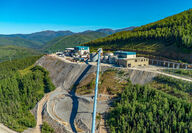
Alaska mines produced roughly $3.13 billion worth of non-fuel minerals last year, down roughly 9 percent from the US$3.44 billion in 2018, according to Mineral Commodity Summaries 2020, an annual report published by the U.S. Geological Survey on Feb. 6 – the earliest comprehensive source of world mineral production data. The drop in Alaska mine production value is largely due to lower output from the two largest gold mines in the state – Fort Knox and Pogo. According to ear...

USA Rare Earth LLC and Texas Mineral Resources Corp. has made a major advancement toward developing the heavy rare earth separation technology that the U.S. Army is looking to invest in. The Army recently sent memos requesting information on the costs to develop separation facilities that can produce heavy rare earths, which tend to be the least abundant but most highly prized of the 17 elements considered rare earths. Further details on the Army memos and Pentagon's push to...

From helmet mounted radios to laser guided missiles, rare earth elements (REE) are an essential ingredient to the advanced hardware used by the U.S. military. These high-tech metals, however, are not produced in America, forcing the Pentagon to depend primarily on China for its supply. As part of a joint armed forces effort to establish a domestic source of rare earths, the U.S. Army is looking to invest in the processing facilities needed to ensure a reliable supply of these...

In a recent letter to the White House, Alaska Governor Michael Dunleavy has requested that U.S. President Donald Trump consider designating the Graphite Creek mine project and associated processing facility as a high-priority infrastructure project under Executive Order 13766, signed by Trump shortly after he took office in 2017. "Graphite Creek is the largest deposit of graphite in the nation, and would be a superior domestic supply of this critical mineral, which is...

Graphite One Inc. Sept. 9 announced it has secured the funding to finalize a prefeasibility study for its Graphite Creek project in western Alaska. Taiga Mining Company Inc., an Alaska-based company that is a major Graphite One shareholder, has agreed to loan Graphite One US$4.8 million for the advanced engineering and economic study for developing a graphite mine and processing facility. "In our current challenging capital markets, a commitment of US$4.8 million – which is ex...

Ucore Rare Metals Inc. has unveiled a three-tier strategy for delivering a non-Chinese source of rare earth elements to North American markets from its Bokan Mountain project in Alaska. Called M3, for mines, metals and markets, Ucore's plan to meet the needs of an independent rare earth supply chain in the United States includes three initiatives: advancing its Bokan-Dotson Ridge rare earths project in Southeast Alaska to shovel-ready status; developing an associated facility...

With the issuance of five presidential determinations related to the domestic production of rare earth metals and magnets, President Donald Trump is making it clear the White House sees this group of 17 technology elements as essential to the security of the United States. In five memos sent to the secretary of defense on July 22, Trump made an official determination under Section 303 of the Defense Production Act of 1950 that domestic production, separation and manufacturing...
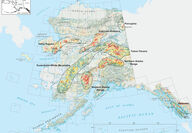
Earlier this month Reuters reported that several agencies within the U.S. Federal government were "rapidly assessing" our domestic ability to mine and refine rare earth elements and utilize those 17 super cool elements in value-added products needed for a wide and ever-growing array of consumer and national defense products. Not surprisingly, mining industry officials demurred when quizzed about supplying information on where rare elements might be mined in the U.S. and how...

Margaux Resources Ltd. June 24 announced a milestone in achieving its plans to acquire and explore the Cassiar gold project in northern British Columbia from Wildsky Resources Inc., formerly China Minerals Mining Corp. The 56,000-hectare (138,380 acres) Cassiar property hosts both lower grade bulk tonnage and high-grade vein occurrences across a 15-kilometer (nine miles) structural corridor. Bisected by Highway 37, the property also boasts significant existing infrastructure,...

Canada is one of the world's richest sources of raw commodities, not least of which are the so-called rare earth elements. While China currently dominates global production and hosts some 35 percent of the world's known resources, observers believe Canada is endowed with world-class rare earths deposits, which could account for as much as 40-50 percent of the world's REE reserves. Demand for rare earth elements, along with lithium minerals, tin and other critical materials,...

Washington D.C.'s increased interest in securing a steadfast supply of critical minerals may prompt further advancement at Ucore Rare Metals Inc.'s Bokan Mountain, a Southeast Alaska project that hosts seven of the 35 minerals, metals and groups of elements that are considered critical to the United States. A federal interagency report published earlier this month by the U.S. Department of Commerce, "A federal strategy to ensure secure and reliable supplies of critical...

Constantine Metal Resources Ltd. June 3 released a preliminary economic assessment for Palmer that outlines an economically robust and environmentally conscientious mine for the volcanogenic massive sulfide project in Southeast Alaska. "This PEA is the most significant milestone for Constantine to date, demonstrating a high-quality project with strong economics and a progressive, environmentally conscious mine design," said Constantine Metal Resources President and CEO...

When it comes to rare earths, China has a strategy that goes beyond using these high-tech elements as ammunition for the next salvo in a trade war with the United States. This strategy, which was set into motion around 1980, involves gaining an advantage in high-tech manufacturing by controlling the first three links of the rare earth element supply chain – mining, processing and value-added manufacturing. Over the ensuing four decades, the Middle Kingdom has gained a near m...

Antimony is a poor conductor of heat, an attribute that lends itself to this semi-metal's most common use, as an ingredient to make clothing, mattresses and other products flame resistant. While making work clothes and household items safer and less likely to catch fire is a relatively new use for antimony, humans have been using antimony for other purposes for more than 5,000 years. "For example, the ancient Egyptians and early Hindus used stibnite, which is the major ore...

Extremely hard and with the highest melting point of all the elements on the periodic table, tungsten is vital to a broad spectrum of commercial and military applications, yet there are no mines in the United States producing this durable metal. Nearly 60 percent of the tungsten consumed in the U.S. during 2018 was used to make the cemented tungsten-carbide, a compound of roughly equal parts tungsten and carbon. Roughly twice as strong as steel, tungsten carbide is often...

At least 125 million electric vehicles are expected to be traveling global highways by 2030, which means the world is going to need a lot more graphite in the coming decade and beyond. This is because graphite serves as the anode in the lithium-ion batteries that power these EVs, not to mention the growing number of portable tools and electronics that use the same type of battery. According to Mineral Commodity Summaries 2019, an annual report published by the United States...

In addition to being a past producer and a future source of most of the 35 minerals and metals considered critical to the United States, Alaska currently contributes a globally significant amount of one of these vital metals – germanium. While not a widely known metal, germanium has optical qualities that make it an important ingredient in fiber-optics, infrared optics, electronics and solar energy systems. "The extensive use of germanium for military and commercial a...

If you are reading this article on your computer, tablet or phone, you are almost certainly looking through indium as we speak; and, if that devise happens to be a touchscreen you have the unique properties of this critical mineral to thank as you scroll down to read more about indium and where it can be found in Alaska. This is because indium-tin oxide is used as a transparent conducting film applied to virtually every flat-panel display and touchscreen on the market. This...

While not the flashiest of the 35 minerals on the United States Geological Survey's critical list, barite plays an essential role in America's energy sector. Barite derives its name from barús, the Ancient Greek word for heavy, owing to an exceptionally high specific gravity for a non-metallic mineral. It is this weight that makes barite a key element to the oil and gas sector and lands the mineral on USGS' critical list. "More than 90 percent of the barite sold in the United...